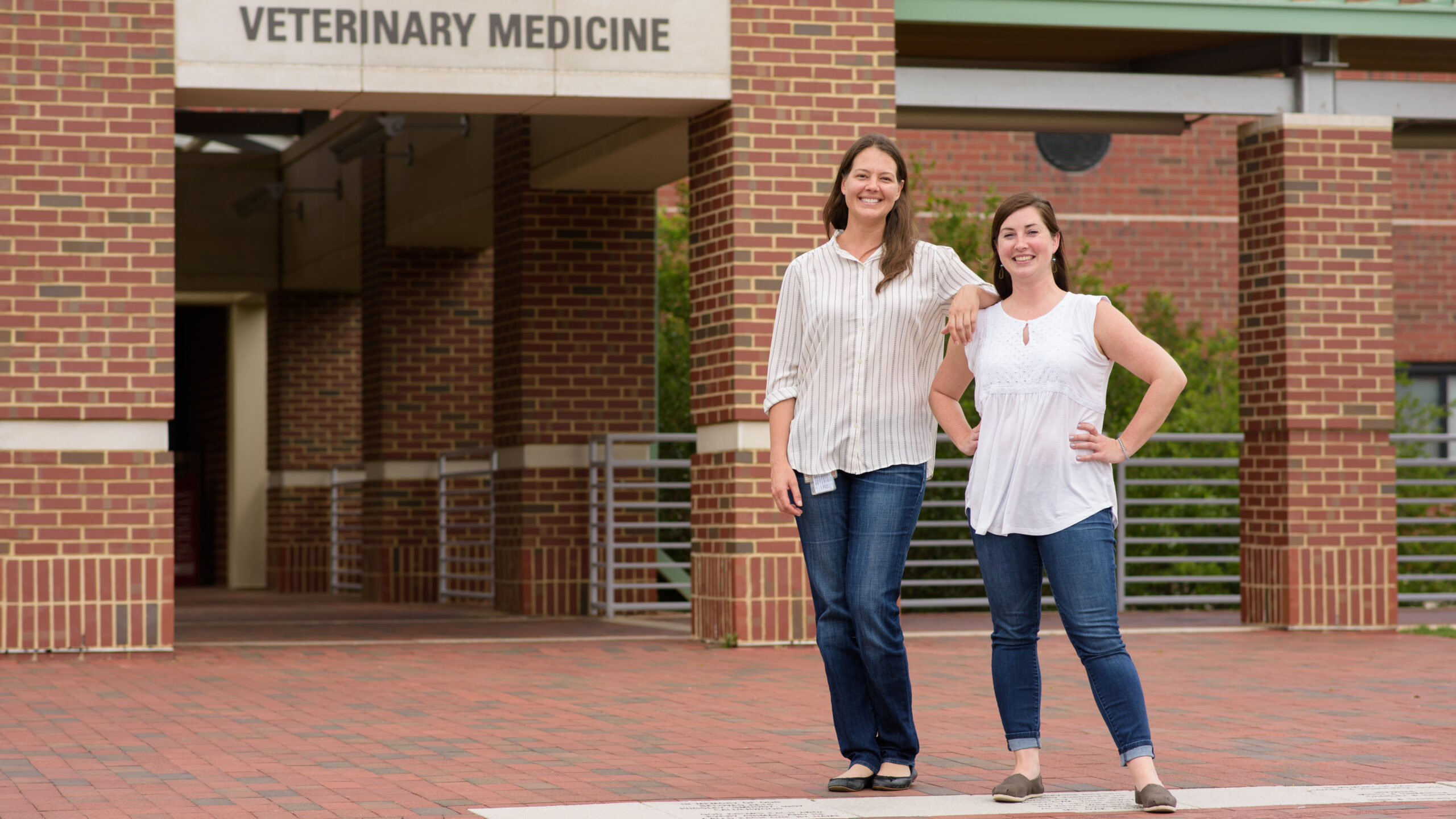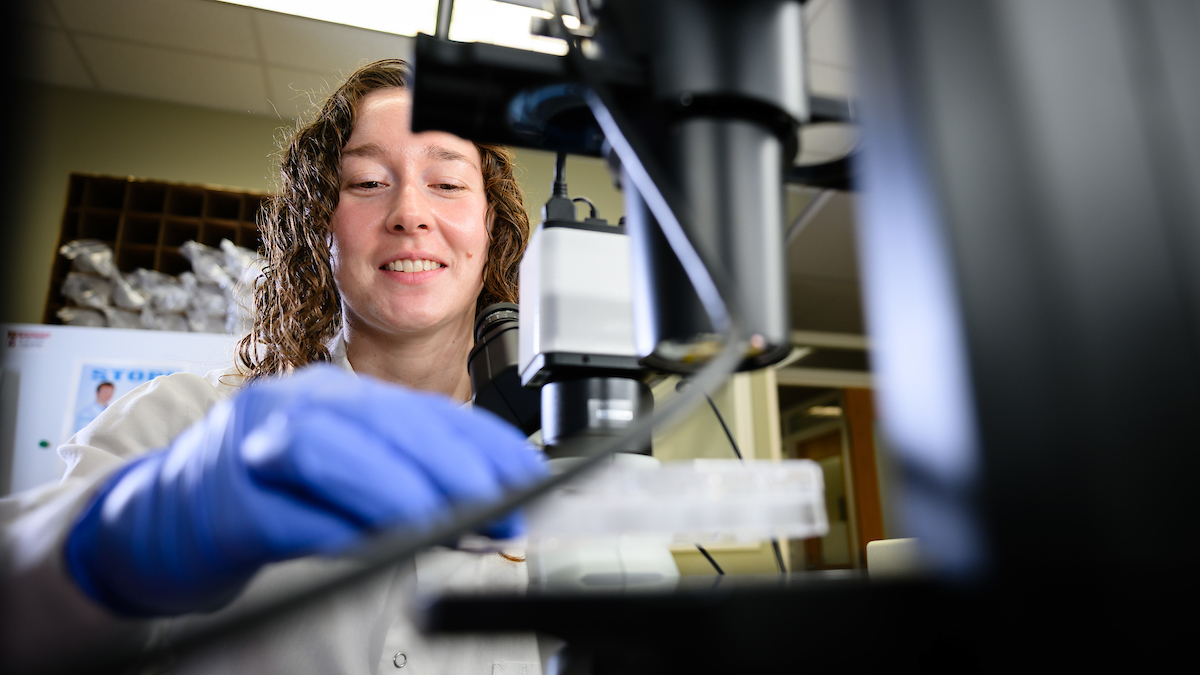Passing Gas Podcast: Off the Cuff and On the Mark

Within the first few minutes of a Passing Gas podcast you know exactly what you’re about to get into.
“There are two questions that we ask all of our guests,” said Kristen Messenger during a taping in May. “Dr. Bailey, would you like to do the honors?”
“So the first question is what is your favorite monitor?” Kate Bailey asked the week’s guest, Jon Congdon, the new director of the NC State Veterinary MRI.
“If I had to pick one, it’s a capnograph,” said Congdon.
A capnograph, by the way, monitors carbon dioxide levels in animals undergoing anesthesia.
“AHHH! That’s mine!” Bailey quickly responded.
“So the other question that we ask everyone is what’s your favorite GABA agonist,” said Messenger.
Yes, you’re about to get unabashedly excited about the complex world of veterinary anesthesia and pharmacology because Bailey and Messenger are so excited about it all. A GABA agonist? That’s a drug that used in sedation, and the Passing Gas hosts definitely have favorites.
The Passing Gas podcast was launched last year the NC State College of Veterinary Medicine by Bailey and Messenger, CVM alums-turned-faculty members. It’s an educational tool that doesn’t feel like one. It’s a conversation, it’s an insider’s guide. It has purpose and personality.
Episodes, about 20 minutes each, are recorded weekly during the fall and spring semesters and available to students on class websites. The episodes alternate between topics related to Bailey’s specialty, anesthesiology, and Messenger’s, pharmacology.
But Passing Gas isn’t a lecture material rehash. Each episode, recorded in a small studio on campus and produced by CVM visual arts specialist Philip Ruckart, is peppered with relatable tidbits and honest perspective that may get lost in the PowerPoint shuffle of a lecture hall. It’s a study supplement that manages to be informative and reassuring, especially for second-year CVM students who are taking classes with direct clinical applications for the first time starting with the fall semester. The podcast allows them to absorb new material in a different, entertaining way whenever they want, wherever they want, however they want.
“The goal with each episode,” Messenger said, “is for students to get that one little pearl, that one piece of information that sticks with you.”
If a recent classroom lecture covers how to properly use drug-delivery machines during anesthesia, a subsequent Passing Gas episode goes a step further. Bailey and Messenger will likely chat about mistakes they’ve made themselves when learning to use such machines as students. If a lecture is about oxygen levels, Passing Gas may go into detail about memorable cases when oxygenation was challenging and what the two learned from the experience. Whatever the lecture topic, Passing Gas unconventionally enriches it.
“I think there are so many interesting components of our field that students are learning, but some of that knowledge happens when it’s off the cuff,” said Messenger, assistant professor of pharmacology. “It comes in the form of talking to others, saying, ‘I have to tell you about what happened to me today.’ That’s a big part of the podcast.”
Think of Passing Gas as a lecture’s after party.
“It is information that we think is extremely important for students to know,” said Bailey, clinical assistant professor of anesthesiology. “It just happens to be surrounded by fun.”
It’s fun because Bailey and Messenger’s close friendship shines through.
While they overlapped as CVM students — Messenger graduated in 2006, Bailey in 2009 — they didn’t get to know each other until Messenger returned to the CVM for an anesthesia residency (she later switched fields to pharmacology). After a case, Messenger suggested over lunch to Bailey, then in her final year as a DVM student, that she should consider an anesthesia residency, too.
They’ve further bonded over a mutual love of podcasts; they listen to them together while on road trips to veterinary conferences. Ask them about their favorites and they’ll whip out their phones and run down a list: “History of Science,” “The Elective Rotation: A Critical Care Pharmacy Series, “The Skeptics Guide to the Universe,” “1,001 Heroes, Legends, Histories & Mysteries.”
They approach their own podcast by combining anesthesiology and pharmacology topics and give them a real-world feel. To them, that always meant balancing technical information with relatable clinical experiences and making the whole thing entertaining.
“It’s a great example of cognitive apprenticeship. Just like a master might show an apprentice how to correctly perform a technical skill, great teachers help students see — or hear — how they use information to make decisions.” ~ Laura Nelson
Laura Nelson, CVM associate dean and director of academic affairs, enthusiastically approved the project.
“The Passing Gas podcast is a great use of the format,” said Nelson. “They’ve created an entertaining and interesting way for students to engage in and better understand anesthesia and anesthetic pharmacology.”
Nelson said much of what makes anesthesia and pharmacology interesting is the “why”: Why do you use a certain drug over another? Why does a certain monitoring machine work best for a certain procedure? Much of Passing Gas reflects the intuitive aspect of the fields.
“The podcast offers listeners the chance to hear those thought processes in action,” said Nelson. “It’s a great example of cognitive apprenticeship. Just like a master might show an apprentice how to correctly perform a technical skill, great teachers help students see — or hear — how they use information to make decisions.”
Student input is vital to Passing Gas. The first episode encouraged them to help name the podcast. All CVM students are encouraged to send Bailey and Messenger questions on any subject via email or through Twitter (@vetspassinggas). If a student asks them to talk about sea turtle anesthesia, Passing Gas may devote an entire episode to the subject.
Then again, even the hosts don’t know what to expect when they record each episode. During one recent episode they sang songs with clinical assistant professor Alessio Vigani when he stopped by to talk about CPR.
Passing Gas may review serious topics, but it doesn’t take itself too seriously. And that’s what makes it so great.
~Jordan Bartel/ NC State Veterinary Medicine


